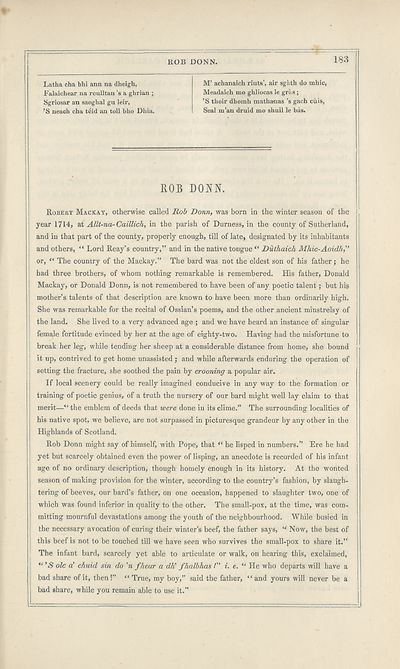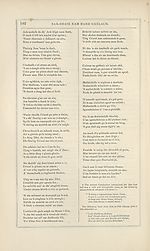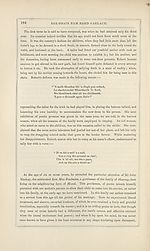Books and other items printed in Gaelic from 1871 to 1900 > Sar-obair nam bard gaelach, or, The beauties of Gaelic poetry, and lives of the Highland bards
(263) Page 183
Download files
Complete book:
Individual page:
Thumbnail gallery: Grid view | List view

ROB BONN.
183
Latha cha bhi ann na dheigh,
Falaichear na reulltau’s a ghrian ;
Sgriosar an saoghal gu leir,
’S neach cha teid an toll bho Dhia.
M’ achanaich riuts’, air sgiith do mbic,
Meadaich mo ghliocas le gras;
’S thoir dhomh mathanas’s gach cuis,
Seal m’an druid mo shuil le bas.
ROB BONN.
Robert Mackay, otherwise called Rob Donn, was born in the winter season of the
year 1714, Allt-na-Caillich, in the parish of Durness, in the county of Sutherland,
i and in that part of the county, properly enough, till of late, designated by its inhabitants
and others, “ Lord Reay’s country,” and in the native tongue “ Duthaich Mhic-Aoidh,"
or, “ The country of the Mackay.” The bard was not the eldest son of his father; he
had three brothers, of whom nothing remarkable is remembered. His father, Donald
Mackay, or Donald Donn, is not remembered to have been of any poetic talent; but his
mother’s talents of that description are known to have been more than ordinarily high.
She was remarkable for the recital of Ossian’s poems, and the other ancient minstrelsy of
! the land. She lived to a very advanced age ; and we have heard an instance of singular
female fortitude evinced by her at the age of eighty-two. Having had the misfortune to
break her leg, while tending her sheep at a considerable distance from home, she bound
it up, contrived to get home unassisted ; and while afterwards enduring the operation of
setting the fracture, she soothed the pain by crooning a popular air.
If local scenery could be really imagined conducive in any way to the formation or
training of poetic genius, of a truth the nursery of our bard might well lay claim to that
merit—“ the emblem of deeds that were done in its clime.” The surrounding localities of
his native spot, wre believe, are not surpassed in picturesque grandeur by any other in the
Highlands of Scotland.
Rob Donn might say of himself, with Pope, that “ he lisped in numbers.” Ere he had
yet but scarcely obtained even the power of lisping, an anecdote is recorded of his infant
age of no ordinary description, though homely enough in its history. At the wonted
season of making provision for the winter, according to the country’s fashion, by slaugh¬
tering of beeves, our bard’s father, on one occasion, happened to slaughter two, one of
which was found inferior in quality to the other. The small-pox, at the time, was com¬
mitting mournful devastations among the youth of the neighbourhood. While busied in
the necessary avocation of curing their winter’s beef, the father says, “ Now, the best of
this beef is not to be touched till we have seen who survives the small-pox to share it.”
The infant bard, scarcely yet able to articulate or walk, on hearing this, exclaimed,
j “ ’S ole a' chuid sin do 'n fhear a dh' fhalbhas /” i. e. “ He who departs will have a
; bad share of it, then!” “ True, my boy,” said the father, “ and yours will never be a
i bad share, while you remain able to use it.”
183
Latha cha bhi ann na dheigh,
Falaichear na reulltau’s a ghrian ;
Sgriosar an saoghal gu leir,
’S neach cha teid an toll bho Dhia.
M’ achanaich riuts’, air sgiith do mbic,
Meadaich mo ghliocas le gras;
’S thoir dhomh mathanas’s gach cuis,
Seal m’an druid mo shuil le bas.
ROB BONN.
Robert Mackay, otherwise called Rob Donn, was born in the winter season of the
year 1714, Allt-na-Caillich, in the parish of Durness, in the county of Sutherland,
i and in that part of the county, properly enough, till of late, designated by its inhabitants
and others, “ Lord Reay’s country,” and in the native tongue “ Duthaich Mhic-Aoidh,"
or, “ The country of the Mackay.” The bard was not the eldest son of his father; he
had three brothers, of whom nothing remarkable is remembered. His father, Donald
Mackay, or Donald Donn, is not remembered to have been of any poetic talent; but his
mother’s talents of that description are known to have been more than ordinarily high.
She was remarkable for the recital of Ossian’s poems, and the other ancient minstrelsy of
! the land. She lived to a very advanced age ; and we have heard an instance of singular
female fortitude evinced by her at the age of eighty-two. Having had the misfortune to
break her leg, while tending her sheep at a considerable distance from home, she bound
it up, contrived to get home unassisted ; and while afterwards enduring the operation of
setting the fracture, she soothed the pain by crooning a popular air.
If local scenery could be really imagined conducive in any way to the formation or
training of poetic genius, of a truth the nursery of our bard might well lay claim to that
merit—“ the emblem of deeds that were done in its clime.” The surrounding localities of
his native spot, wre believe, are not surpassed in picturesque grandeur by any other in the
Highlands of Scotland.
Rob Donn might say of himself, with Pope, that “ he lisped in numbers.” Ere he had
yet but scarcely obtained even the power of lisping, an anecdote is recorded of his infant
age of no ordinary description, though homely enough in its history. At the wonted
season of making provision for the winter, according to the country’s fashion, by slaugh¬
tering of beeves, our bard’s father, on one occasion, happened to slaughter two, one of
which was found inferior in quality to the other. The small-pox, at the time, was com¬
mitting mournful devastations among the youth of the neighbourhood. While busied in
the necessary avocation of curing their winter’s beef, the father says, “ Now, the best of
this beef is not to be touched till we have seen who survives the small-pox to share it.”
The infant bard, scarcely yet able to articulate or walk, on hearing this, exclaimed,
j “ ’S ole a' chuid sin do 'n fhear a dh' fhalbhas /” i. e. “ He who departs will have a
; bad share of it, then!” “ True, my boy,” said the father, “ and yours will never be a
i bad share, while you remain able to use it.”
Set display mode to:
![]() Universal Viewer |
Universal Viewer | ![]() Mirador |
Large image | Transcription
Mirador |
Large image | Transcription
Images and transcriptions on this page, including medium image downloads, may be used under the Creative Commons Attribution 4.0 International Licence unless otherwise stated. ![]()
| Permanent URL | https://digital.nls.uk/107581802 |
|---|
| Description | Out-of-copyright books printed in Gaelic between 1631 and 1900. Also some pamphlets and chapbooks. Includes poetry and songs, religious books such as catechisms and hymns, and different editions of the Bible and the Psalms. Also includes the second book ever published in Gaelic in 1631. |
|---|

